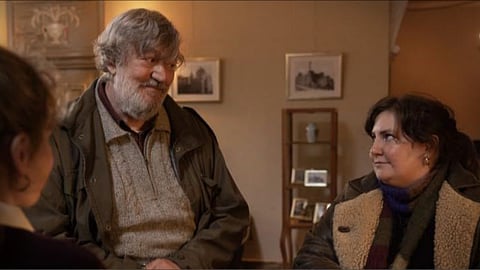Treasure Movie Review: Takes an engrossing premise and does agonisingly little with it
Treasure(2 / 5)
There are two ways in which characters in Julia von Heinz‘s Treasure, the film adaptation of the 1999 novel Too Many Men by Lily Brett, handle trauma. One is by Edek (Stephen Fry), who hides mountains of painful and direct experiences of Holocaust trauma under a blanket of humour and an apparent lack of seriousness. The other is by Ruth (Lena Dunham), Edek's daughter, who, after a streak of personal tragedies, tries to confront her inherited trauma as a means of getting to know her roots.
Add a dysfunctional father-daughter dynamic and a post-Cold War setting to this, and we could have had an intensely moving and bittersweet personal drama about how, even decades after a tragedy, there are still pieces being picked—and how, there always might be, as if you're diving into a never-ending deep sea.
What we end up getting, however, is a rather inert rendition of the Predictable Road Movie where Protagonist #1 subsequently warms up to Protagonist #2 after getting to know what they’ve been through. In this surprising decision to templatise the chilling concept of facing your trauma versus forgetting it, the film ends up becoming a rather confusing collection of haphazardly-strung, half-baked scenes that never really come together.
Take the first act, for example. We are introduced to Ruth, who's waiting for her father Edek to arrive at the airport. He's late, and she's annoyed. They meet each other, she wants to use the loo, and she tells him to stay outside. He doesn't, and she's annoyed. They go to the railway station, and just before getting onto the train, he says they'll go in a cab, and she's annoyed again. We are never allowed to pause for a moment and take in what's happening; it even feels as if the film isn't all that interested in itself. Several scenes later, we get dumped plenty of expository information that should have been conveyed in all that time spent earlier, where, instead of stopping and letting its characters come to life, the film just moves from one uncooked scene to another. At one point, even Ruth seems to exclaim, “We’re off to a rough start.” I silently nodded in my seat.
This approach of never really letting the scenes feel like fully formed, coherent ideas, derails the film, which, when it does let the characters breathe, shows immense potential. There are glimpses of what the film could have been, especially in the portions where the usually jumpy Edek stops in his tracks in his hometown and reminisces. This is a feeling that anyone can relate to—that of visiting a place that once 'belonged' to you. But for some odd reason, heartfelt instances like these are minimised in the film, which instead chooses to spend its time on inorganic sentimentality.
The one portion where the director Julia doesn't hold back is at the death camp of Auschwitz, and this portion is arguably the film’s best. As they look at the camp and Ruth asks Edek if he’s doing okay, he silently says, “There’s nothing they can do to me here now.” Stephen Fry embellishes this line with just the right amount of fear and sadness of a man so hesitant to acknowledge his baggage.
Elsewhere, his performance is a hit and a miss. He’s terrific in the scene where he hugs the coat that was once his father’s—when he finally lets loose and cries, it really feels like cracks breaking through a wall. But for most of the film, he plays Edek with a sense of animation that doesn’t fully feel authentic to the character, and it doesn't help that he's seldom put in situations where we understand what's going on with him.
As for Ruth, she seems to have so many layers to her—she seems to be fighting symptoms of depression, she seems to have an eating disorder, she doesn't accept love easily, and so on—but with each of these layers, the film just touches upon them and expects us to complete the picture. This makes Ruth come across more as an idea of how generational trauma can be manifested, rather than an actual person.
What adds to the feeling of “the film isn’t doing enough” is its tendency to constantly cut short its emotional moments with misplaced jokes. At many points, I was wondering, “Maybe this is the approach it wants to take? Maybe it wants to be subtle and not push enough?” But with this approach, nothing really hits the viewer. Moreover, it’s not like the film doesn’t try to sentimentalise things (in one emotional reconciliation scene, the dreaded Crying Piano starts playing, urging us to realise the emotion). It keeps setting up situations that will tug at your heart strings, and it keeps leaving these situations to move on to the next.
What does work is the depiction of Poland following the Fall of the Iron Curtain. There's a petrifying sense of eeriness to the place, and along with cinematographer Daniela Knapp's dim visuals, it feels like we're on a different planet.
However, it is not a great sign when the surroundings of the film show much more character than its actual scenes. It feels like peeling an orange that you bought with your hard-earned money, and then eating the peel.


